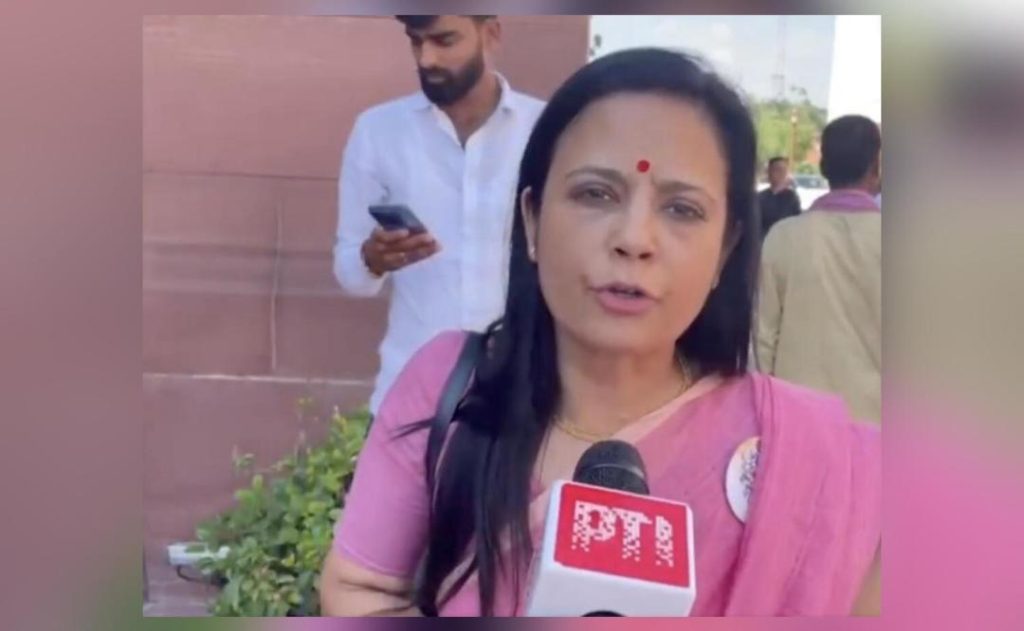
Amit Shah Coward: Sat in 4th Row to Bring Constitutional Amendment, Says Moitra
The ongoing debate in the Indian parliament has taken a turn, with TMC MP Mahua Moitra criticizing Union Home Minister Amit Shah for sitting in the fourth row while tabling the bills that propose to remove from office the Prime Minister, Chief Ministers, and other ministers if they are held in custody for 30 consecutive days. Moitra’s remark has sparked a heated debate, with many questioning Shah’s courage and intentions behind his unusual seating arrangement.
According to reports, the bills, which aim to make the country’s political leadership more accountable, were introduced in the Lok Sabha on Monday. However, instead of sitting in the first row, as is customary for a minister tabling a bill of such significance, Shah chose to sit in the fourth row. Moitra, who was present in the House during the proceedings, could not help but notice the unusual seating arrangement and took to social media to express her disappointment and frustration.
“Cowardice has no place in politics,” Moitra tweeted. “First, they deployed marshals for the Opposition, and then he sat in the fourth row like a coward. What’s more, he wants to take away our right to protest and express dissent. We will not let that happen.”
Moitra’s tweet sparked a flurry of reactions, with many weighing in on the issue. Some praised Shah’s decision, saying that it was a sign of humility and a willingness to listen to others. Others, however, saw it as a sign of weakness and a lack of confidence in his own abilities.
The controversy surrounding Shah’s seating arrangement has raised questions about the government’s intentions behind the proposed bills. Moitra, who has been a vocal critic of the government’s policies, sees the bills as an attempt to silence the opposition and stifle dissent. “These bills are designed to curb our right to protest and express dissent,” she said. “The government is trying to create a culture of fear and intimidation, and we will not let that happen.”
Moitra’s criticism of Shah’s seating arrangement has also been seen as a reflection of the growing divide between the ruling party and the opposition. The government has been accused of using its majority to push through contentious bills, and Moitra’s remarks have added fuel to the fire.
The controversy has also raised questions about the role of the Opposition in the country’s political system. Moitra, who has been a vocal critic of the government’s policies, believes that the Opposition plays a vital role in holding the government accountable. “The Opposition is not just a rubber stamp,” she said. “We have a responsibility to question the government and ensure that it is working in the best interests of the people.”
The proposed bills, which aim to remove from office the Prime Minister, Chief Ministers, and other ministers if they are held in custody for 30 consecutive days, have been met with widespread criticism. Many have argued that the bills are unconstitutional and will create a culture of fear and intimidation.
The government, however, has defended the bills, saying that they are necessary to ensure accountability and transparency in government. “These bills are designed to ensure that the government is accountable to the people,” said a government spokesperson. “We believe that they will help to build a more transparent and accountable government.”
The controversy surrounding Shah’s seating arrangement has also raised questions about the role of the Speaker of the Lok Sabha in the country’s political system. Moitra, who has been a vocal critic of the Speaker, believes that the Speaker has a responsibility to ensure that the House is run fairly and democratically. “The Speaker has a responsibility to ensure that the House is run fairly and democratically,” she said. “We will not let the government use its majority to push through contentious bills without giving the Opposition a fair hearing.”
In conclusion, the controversy surrounding Amit Shah’s seating arrangement has raised important questions about the role of the Opposition in the country’s political system. Moitra’s criticism of Shah’s decision has been seen as a reflection of the growing divide between the ruling party and the opposition, and has sparked a heated debate about the government’s intentions behind the proposed bills.
As the debate continues, one thing is clear: the role of the Opposition in the country’s political system is more important than ever. The Opposition plays a vital role in holding the government accountable and ensuring that it is working in the best interests of the people. Moitra’s remarks have added fuel to the fire, and it remains to be seen how the government will respond to the growing criticism.






